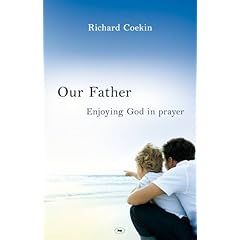
Richard Coekin has written a great book on prayer, and the Lord's Prayer in particular. Our Father: Enjoying God in Prayer is a tremendous encouragement for all pray-ers, particularly those who find praying difficult or boring. As Coekin says, we need a fresh appreciation of God, not techniques or rebukes.
Our Father certainly provides this fresh appreciation, as we are led through the petitions of the Lord's Prayer, one by one. With a robust vision of God as loving Father who delights to hear our prayers; the great King who reigns supreme; the provider of all that we need; the pardoner of our sin; and the protector of his people, our hearts are stirred to pray.
Each chapter takes one petition and examines the context of the Lord's Prayer within the Sermon on the Mount, as well as the wider biblical context and background, giving a comprehensive overview of the full Bible story. With thought-provoking and memorable turns of phrases, Coekin comforts and challenges us into greater dependence on the Lord of the prayer. For example:
Explaining our prayerlessness does nothing to reduce hte spiritual sickness it creates.
Prayer is not about getting what we want; it's about wanting what God wants for us and for others.
Although we are more sinful than we ever realised, we are more loved by our Father than we ever dared hope.
When we pray 'your kingdom come' we ask the Father to rule by his Son, the scarred Saviour and caring King.
There was just one section I wasn't entirely sure of, when he seemed to get his persons of the Trinity mixed up when discussing 'Hallowed be your name'. Tracing through the Bible story the names of God, he picks up on Elohim, Yahweh, Father and Jesus. He makes the useful point that Jesus is God, yes, but at the expense of confusing the persons of the Trinity, as seen in this summary sentence:
In the Lord's Prayer, Jesus tells us to pray that everyone will honour our Father, as he is revealed by his name, to be Elohim our Creator, Yahweh our Redeemer and Jesus our Saviour.
It seems to me that this is almost modalism (or Sabellianism), where the persons of the Trinity are just different modes of God's action, as opposed to distinct persons within the Godhead who work in perfect harmony.
Nevertheless, Our Father is still a useful book on prayer, and perhaps the highlight is the inclusion at the end of each chapter of a mini soap-opera series demonstrating how someone could pray each phrase of the Lord's Prayer in their daily life, reacting to their situations and circumstances. At the church Prayer Meeting on Tuesday night, we used the book to guide us through the meeting, stopping on each phrase and finding encouragement to pray before using each petition to direct our prayers. A great Christmas present for someone who may be new to the faith and wanting to learn about prayer, or someone who has been a Christian for a long time and needs some fresh encouragement to 'take it to the Lord in prayer.'
No comments:
Post a Comment